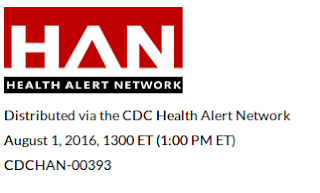#11,600
In conjunction with the travel warnings issued earlier today, the CDC has released guidance for clinicians who may be called upon to test, or treat, women of child bearing age who may have been exposed to the Zika virus in South Florida.
Due to the length, and technical nature of this HAN advisory, I've only included some excerpts. Clinicians and other healthcare providers will want to follow the link to read it in its entirety.
CDC Guidance for Travel and Testing of Pregnant Women and Women of Reproductive Age for Zika Virus Infection Related to the Investigation for Local Mosquito-borne Zika Virus Transmission in Miami-Dade and Broward Counties, Florida
Distributed via the CDC Health Alert Network
August 1, 2016, 1300 ET (1:00 PM ET)
CDCHAN-00393
Summary
The Florida Department of Health (FL DOH) has identified an area with local mosquito-borne Zika virus transmission (active Zika virus transmission) in Miami (http://www.cdc.gov/zika/intheus/florida-update.html). Based on the earliest time of symptom onset and a maximal two-week incubation period for Zika virus, this guidance applies to women of reproductive age and their partners who live in or traveled to this area after June 15, 2016.
This is an ongoing investigation, and CDC is rapidly learning more about the extent of active Zika virus transmission in the area identified by the FL DOH. With the recommendations below, CDC is applying existing guidance to the occurrence of Zika virus transmission in this area of Florida. As more information becomes available, we will update these recommendations.
Recommendations
Pregnant women should avoid non-essential travel to the area with active Zika virus transmission identified by the FL DOH.
Pregnant women and their partners living in or traveling to the area with active Zika virus transmission identified by the FL DOH should follow steps to prevent mosquito bites (http://www.cdc.gov/zika/prevention/prevent-mosquito-bites.html).
Women and men who live in or who have traveled to the area with active Zika virus transmission identified by the FL DOH and who have a pregnant sex partner should consistently and correctly use condoms or other barriers to prevent infection during sex or not have sex for the duration of the pregnancy.
All pregnant women in the United States should be assessed for possible Zika virus exposure during each prenatal care visit. Women with ongoing risk of possible exposure include those who live in or frequently travel to the area with active Zika virus transmission identified by the FL DOH.
(Continue . . . .)
